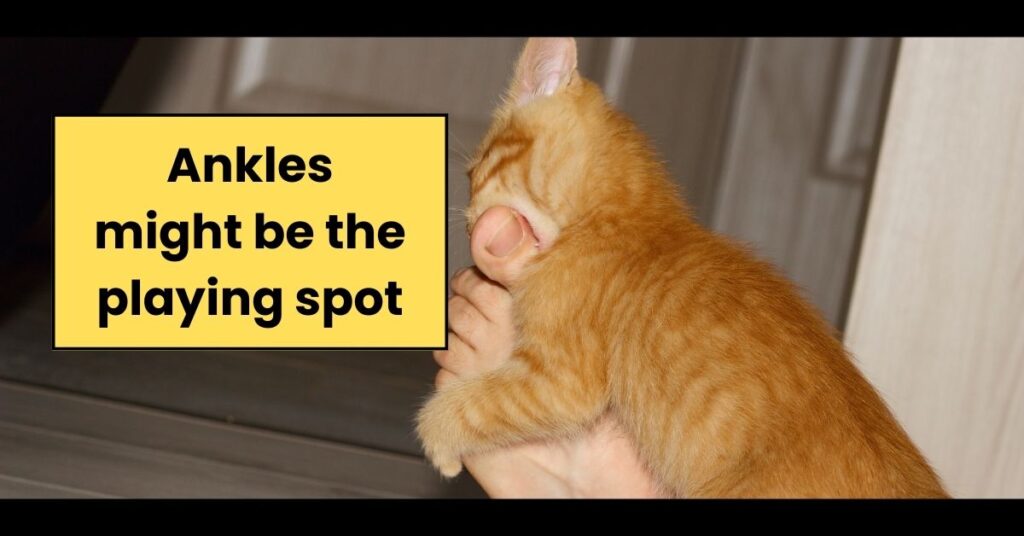If you’ve ever had a kitten, you know their playful biting can be quite painful! While it may seem like your kitten is just playing around, there are reasons for these sneak attacks that are entirely natural, mostly innocent, and relatively. In this article, we’ll explore why kittens bite ankles and how to stop them from doing it. Why Does My Kitten Bite My Ankles?
One of the most common questions new kitten owners ask is, “Why does my kitten bite my ankles?” Kittens are natural-born hunters, and their instinct is to stalk and pounce on anything that moves. This includes your feet and ankles! This type of cat behavior carries over into adulthood, which is why your kitten might bite your ankles when they’re feeling playful.
Reasons Why Kittens Bite:
There are a few reasons why kittens bite.
Newbies Habit:

If you have recently introduced a new kitten into your home, they may also be feeling insecure and could be using ankle biting as a way to assert their dominance.
If you think they may feel insecure, try providing them with a safe place to retreat when they feel overwhelmed, such as a cat tree or bed.
Boredom:
Other factors influencing ankle biting include boredom, attention-seeking behavior, or playfulness. If a kitten is bored, it may start to nibble on its own or others’ ankles as a way to relieve boredom or get attention. Some kittens may nip at ankles during playtime as part of their natural predatory instinct.
Hunting Skills:
Contrary to what some people may believe, cats do not usually attack ankles out of aggression. These beautiful creatures are natural hunters. Unfortunately for cat owners, human feet are roughly the size and shape of small animals. Therefore, your cat may use your feet as target practice for their hunting skills.
Note: Redirect her hunting instincts by playing “prey” with a toy. With patience and positive reinforcement, you can train your kitten not to bite your ankles.
Ankles might be the playing spot:

Alternatively, the shuffling of human feet may strike a cat as an invitation to play. Owners often react playfully when they have their ankles swatted, so in a feline’s mind, this could look like the owner is engaged in the game, further encouraging it.
Psychological reasons:
Furthermore, studies have shown that cats may even bite their owner’s ankles for psychological reasons.
If a cat loses access to its mother and siblings at too young, it might not know when its playfulness becomes too aggressive.
Medical Reasons Behind This Type of Kitten’s Behavior:
Occasionally, cats biting at their owners’ ankles can stem from a medical condition known as hyperthyroidism, which causes an imbalance of hormones in older felines
- A common symptom of hyperthyroidism is extreme restlessness which can manifest in ankle-biting. In this case, a cat is likely trying to tell its owner that it is not feeling well.
- Other symptoms include extraordinary thirst, intermittent vomiting, and diarrhea.
How To Teach Your Kittens the Difference Between Ankle And Playing Things?

- If you don’t want your cat to attack your hands and feet, it’s best to teach them from the get-go that these are not acceptable playthings.
- Discourage hand and foot biting by distracting them with suitable toys.
- Never swat at or yell at your kitten when they bite your ankles, cheeks or chin as this may turn their play aggression into real aggression or, worse, make them scared of you.
Conclusion:
It’s normal for a kitten to want to play with your ankles. If your kitten is biting more than usual, If you are unsure of what steps to take, it is in your best interest to consult with a trainer or a veterinarian.
FAQ’s
How Can I Keep My Kitten Entertained?
There are endless specially designed products available with which you can entertain your cats. Interactive toys, puzzle feeders, and soft toys – even boxes – are all good options to keep your kitty stimulated.
Why Does Kitten Want An Outlet For Their Energy?
Remember that these animals need an outlet for their Energy, and as their human, it is your job to provide them with a stimulating living environment.
Getting A Feline Mate Is A Solution?
You should think about getting another cat friend for your pet. Your kitten may find a more appropriate outlet for its prowling activities if it is adopted along with another cat. Find your kitten a suitable companion by contacting your local animal shelter.




